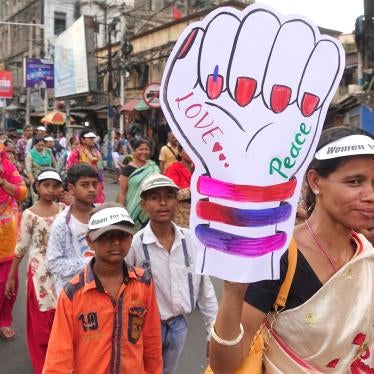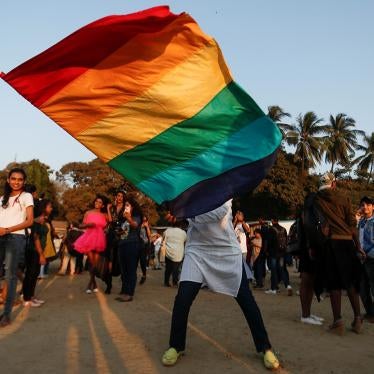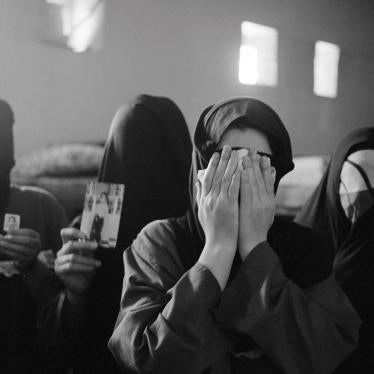Bangalore human rights organizations, including the People’s Union for Civil Liberties-Karnataka (PUCL-K), have extensively documented police harassment and abuse of hijras. In Bangalore, as elsewhere in India, hijras are often unable to obtain identity papers because their gender identity and appearance do not correspond to their sex at birth. As a result, many cannot find housing, education, or legal employment – or, in many cases, even vote. The effective loss of basic citizenship rights – coupled with widespread social prejudice against people who violate norms for “masculinity” and “femininity” – leaves them economically marginalized and exposed to police abuse.
At 11:00 a.m. on October 20, police arrested five hijras in the Girinagar neighborhood of Bangalore, charging them with “extortion.” Arrests of hijras for begging are commonplace, and the extortion charges are apparently related to this offence. Unlike begging, however, extortion is a non-bailable offence under the Indian Penal Code (IPC). This charge allowed police to hold them in the station rather than removing them quickly to a “beggars’ colony,” which is standard procedure in such cases. That same day, the Mumbai-based Daily News and Analysis reported that Bangalore’s Deputy Commissioner of Police (South) had launched a new “drive against the city’s eunuch menace.” The unusual severity of the charges suggests that the arrests may have marked the beginning of that drive.
In Girinagar police station, police verbally abused the hijras and beat one severely with a lathi (stout stick). Five members of the crisis intervention team from the Bangalore non-governmental organization Sangama arrived at the Girinagar police station to inquire about the arrests and assist in the hijras’ release. Sangama works to protect and advance the human rights of sexual minorities (a term used to include LGBT and intersex people, along with others facing discrimination or abuse on the basis of their consensual sexual conduct, sexual orientation, or gender identity). All the members of the crisis team have been trained in fundamental legal procedures and regularly interact with the police in cases involving arrests and detention of LGBT people in Bangalore.
The work of Sangama’s crisis teams has been recognized as a model by the National AIDS Control Program (NACO) of the Indian Government. To address police abuses against communities affected by HIV/AIDS, NACO has promised that: “specific projects will be designed to empower the communities to provide crisis intervention services that will consist of mobile helplines, services of a lawyer and field supervisors. This model implemented by Sangama, a [sic] MSM and transgender network in Bangalore, has been able to demonstrate its efficacy by ensuring that the response time to a crisis situation never exceeds half an hour.”
However, what ought to have been a straightforward procedure turned into a nightmarish ordeal for the hijras, the activists, and several of their colleagues over the next day-and-a-half. Girinagar police sent the crisis team to the Banashankari police station. Members of the team told Human Rights Watch that, at Banashankari, the assistant commissioner of police (ACP) for Bangalore, H.T. Ramesh, and Police Inspector (PI) Shivashankara Murthi abused them, slapped two of them repeatedly, kicked them, and beat them with lathis. They were then driven back to Girinagar station, where police sexually abused two members of the crisis team, claiming that they wanted to find out if they were women or men.
Police charged the five human rights defenders with unlawful assembly, joining an unlawful assembly ordered to be dispersed, rioting, and obstructing a public servant from discharge of his duty (Sections 143, 145, 147, and 353 of the IPC, respectively). They were eventually released on bail on the evening of October 21.
Upon receiving telephone calls from the arrested activists, about 150 human rights activists – including lesbians, hijras, gay men, bisexuals, sex workers, transgender people, trade union leaders, Dalit activists, and women’s rights activists – along with lawyers, gathered outside Banashankari police station. After attempting to negotiate with the police to have the crisis team members released, the activists began a peaceful protest at about 7:00 p.m. ACP Ramesh asked six activists to enter the police station to begin a dialogue. However, once they were in the station, ACP Ramesh and PI Murthi told them that police would not release the people in custody. They said: “We have orders from the senior officials to round up all hijras on the streets of Bengaluru [Bangalore] and book them under extortion cases.”
When the activists argued against these measures, ACP Ramesh ordered their arrests. The activists told Human Rights Watch that police – including Ramesh and Murthi – pushed, beat, verbally abused, and sexually harassed them. According to the activists, police grabbed two of the women’s breasts while placing them in the lockup, and sexually harassed two hijras. For over four hours, police gave the prisoners no water and did not allow them to visit the toilet. They were also not allowed any contact with their five colleagues at Girinagar police station, who had been remanded into police custody. When the activists demanded that police not violate their human rights, the policemen answered: “Stop us if you can.”
Lawyers who arrived to represent these six activists at Banashankari police station were not allowed to meet their clients for about two hours. When they were finally brought to meet the lawyers, police punched and jostled the detainees. One woman told Human Rights Watch that PI Murthi pushed her and grabbed her breasts, and when she objected to him touching her, he began to kick her on the thighs and buttocks, screaming at her until she fell down. Three days after the incident she still had trouble walking.
The six activists were released at about 11:00 p.m. without charges being pressed. They immediately went to medical examiners to document the injuries police had inflicted.
Soon after the six activists entered the police station at 7:30 p.m., police started attacking the other activists still gathered outside, particularly targeting those who had cameras. Police charged the gathering with lathis and arrested 31 people, beating some of them while hustling them into a police van. They were driven to the Central Reserve Police Force grounds on Mysore Road some miles away. The 31 activists spent about seven hours locked inside the van, without enough room to lie down or stretch. Some of them were also sexually harassed by the police personnel. One policeman put his hand on the crotch of an individual who identifies as a female-to-male transsexual, and demanded to know whether he was female or male.
At midnight, the 31 activists held in the police van were brought to the residence of a magistrate in Koramangala. Lawyers who had arrived to represent them had to block the road physically to keep the police from driving the activists away again, instead of producing them before the magistrate. Police claimed that they would not produce the activists because they had no legal representation, even though several lawyers were already there.
When the activists told the magistrate that the police had beaten them, the magistrate held their bail in abeyance until they underwent medical examination.
At 5:00 a.m. on October 21, the police drove the 31 prisoners to the Subramanyapura police station. The lawyers however, were falsely informed that the detainees were being taken to Banashankari police station. Finally, the 31 were delivered to court that afternoon, about 18 hours after their arrests. During that period, they had not been fed or allowed to use a toilet. They were produced before the magistrate at 4:15 p.m. on October 21 and released on a surety of Rs2,000 (about US$40 each). The five hijras originally arrested by Girinagar police on October 20 were freed on bail on October 22.
Delhi’s High Court is currently in the final stages of hearing a petition against the Indian Penal Code’s so-called “anti-sodomy” provision – Section 377, which criminalizes “carnal intercourse against the order of nature.” The petitioners have asked the court to rule that this provision excludes adult, consensual homosexual conduct. Although the government has opposed the claim, the National AIDS Council has supported reading down the provision in a brief filed with the court. Some activists fear that the Bangalore episode may signify a backlash against possible legal reform.
In Bangalore, activists and lawyers have released a press statement detailing the abuses at the hands of the police, and launched a Campaign for Sexual Minority Rights. They ask for the immediate dismissal and prosecution of ACP Ramesh and PI Murthi, as well as legal and social measures to ensure effective human rights protections encompassing sexual orientation and gender identity in Bangalore and in India.








